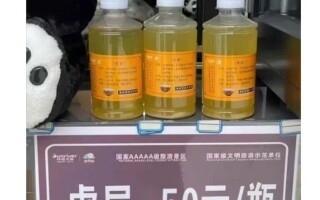
According to information from the South China Morning Post, the zoo recommended mixing tiger bone glue with white wine and applying it to the affected areas along with ointments. They claimed that he has a 'good curative effect' for such ailments as arthritis, rheumatism, and muscular pain.
The zoo asserted that the mix is safe for internal consumption, but it should not be used in cases of allergic reactions. In an interview with the Chinese newspaper 'The Paper', the zoo stated that the tiger bone glue was collected directly from the tiger's body, but did not clarify whether any disinfection procedures were undertaken.
Workers insisted that the mix meets all necessary requirements for it to be classified as 'medicinal' and sold, provided that they have a commercial license with permission to trade. They reported that sales were moderate, as no more than two bottles were sold per day.
One of the zoo's visitors, according to the South China Morning Post, said: 'I bought it for my parents due to their love for traditional medicine, but I did not see any effect, so it’s just glue.'
An expert in traditional Chinese medicine, who refused to disclose his identity, stated that tiger bone glue does not have confirmed medicinal properties and is not recognized as traditional medicine, according to the Global Times.
The zoo in China has faced a wave of criticism on social media after it began selling tiger bone glue, asserting that its 'medicinal properties' could treat rheumatism. One of the zoo's visitors, Yanybiven, in the western southern province of Sichuan, posted on social media claiming that the establishment sells 'medicinal tiger bone glue', which, as stated, comes from Siberian tigers.
The price of a 250-gram bottle of glue is about 50 yuan (about 7 dollars).













